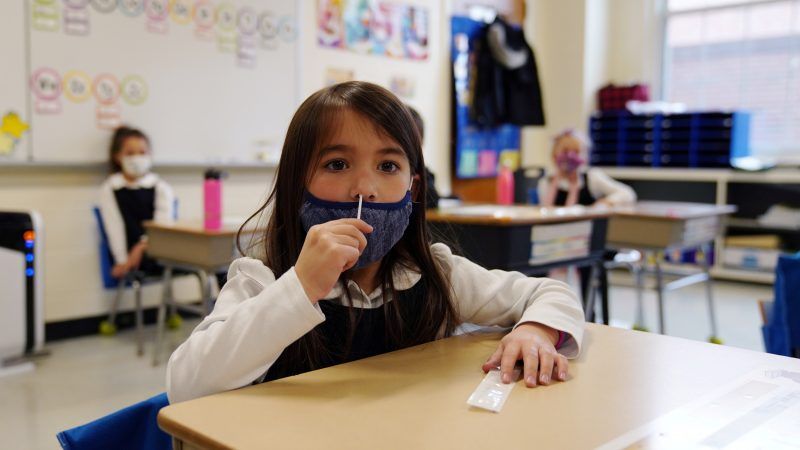Kansas Legislators Want To Expand School Choice Options for Kids Stuck With Virtual Learning
Why not give parents the money to send kids to a private school that is actually open?

Something is happening in Kansas that ideally would spread to every other state in the country: Legislators are looking at ways to expand school choice options for public school students who are stuck with virtual learning.
Lawmakers would like to create a new education savings account (ESA) policy that covers students "whose districts have required remote or hybrid learning for a prolonged period of time," according to The Topeka Capital-Journal. Under the plan, the families of qualifying students would receive access to their own per pupil funding, the amount of money the state provides to the public education system on behalf of each child. They could then spend that money on an education option—like private school—that better meets their needs.
Many Kansas school districts have partly reopened, though it's not clear whether they will stay that way. Broadly speaking, private schools across the U.S. have remained open since September. Pandemic mitigation efforts have inadvertently produced a two-tiered education system: Private school students are overwhelmingly back in school, enjoying something approaching a normal learning experience, whereas many of their public school counterparts are making due with limited in-person instruction or zero in-person instruction. These discrepancies are worst in large cities, where some of the most vulnerable students—those whose family and living conditions make them particularly ill-suited to remote instruction—have gone an entire year without setting foot inside a classroom.
An obvious answer to this problem is to take the money that is being spent on propping up a public education system that is utterly failing to deliver families what they need, and instead let families use the money to arrange better options.
"If a child doesn't get an education, the child and their family lose but yet they have no say in many districts like ours," Joy Eakins, a former Witchita public schools board member and supporter of the new ESA bill, told The Topeka Capital-Journal. "So they are just in this position where [the district] doesn't have to worry about customer service…with some of our kids who need the most help."
Public school officials and teachers unions are skeptical of ESAs, since they threaten the public education system's budget. Districts worry that the plan would cause them to lose money and thus leave them incapable of implementing the necessary COVID-19 safety measures.
But with public schools all across the country signaling a brazen unwillingness to fully reopen next fall—let alone sooner—parents would be right to wonder whether that money is being wasted. Teachers unions in Chicago, San Francisco, Washington D.C., New York City, and countless other cities have fought reopening, even as district officials have largely agreed to meet the unions' safety demands. NYC education officials, including Schools Chancellor Richard Carranza and union boss Michael Mulgrew, are already preparing families to accept a mix of in-person and distance learning in the fall, even though numerous health experts—including those at the Centers for Disease Control—have concluded that many schools could safely reopen right now.
And of course, the reality is that many schools are currently open: They just happen to be private schools. Legislators in Kansas and elsewhere should make it easier for students and their families to access the money being spent on their behalfs and enroll in education options that make sense for them.


Show Comments (25)